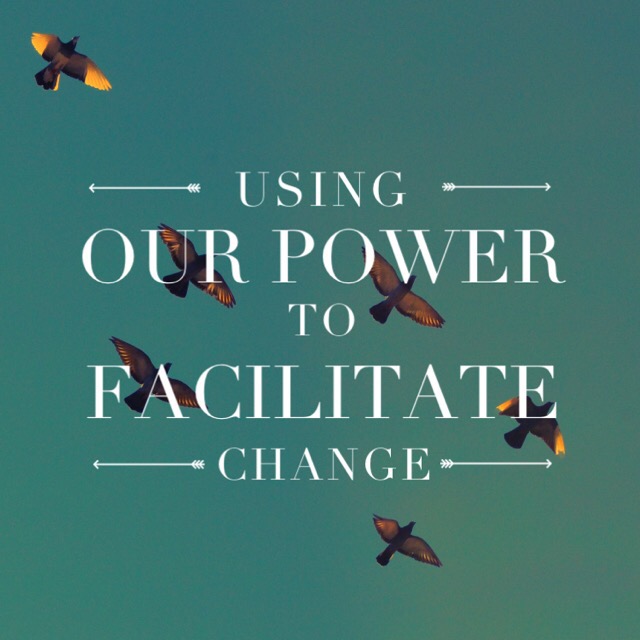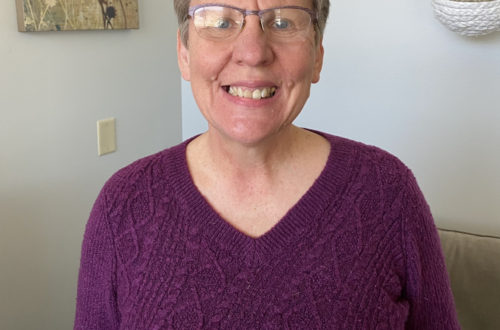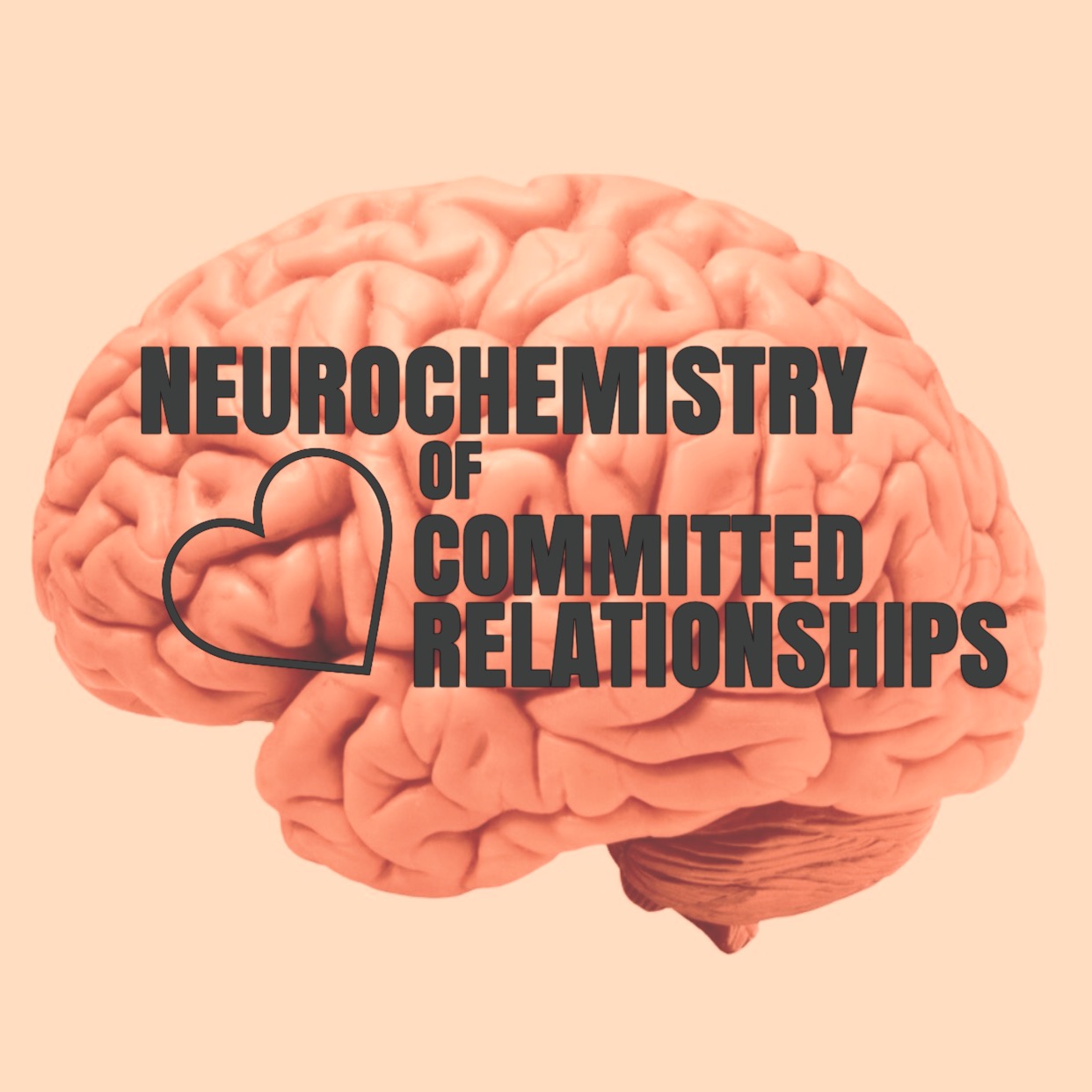
Neurochemistry of Committed Relationships
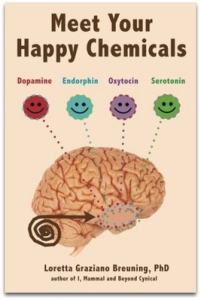 Researchers have noted that there are three stages to the development of love, each with their own set of neurochemical responses. Different “happy chemicals” are released during different stages. Since God made our brains and designed them to meet the needs we have in life, our brains have been specially wired for these stages of falling in love and staying in love. For the purpose of this article, we’ll touch on the first two stages, and concentrate in particular on the amazing chemicals in the emotional attachment stage of a relationship.
Researchers have noted that there are three stages to the development of love, each with their own set of neurochemical responses. Different “happy chemicals” are released during different stages. Since God made our brains and designed them to meet the needs we have in life, our brains have been specially wired for these stages of falling in love and staying in love. For the purpose of this article, we’ll touch on the first two stages, and concentrate in particular on the amazing chemicals in the emotional attachment stage of a relationship.
Stage 1: “Romantic Feelings
During this stage, your partner can seem “perfect” for you because all the crazy endorphins we have in our brain make us feel so happy! We can put our partner on a pedestal.
Stage 2: “Physical Attraction”
This is known as the “lovesick phase,” and honestly it can feel wonderful even though it might feel as if you have the flu. During this stage, you might think about your partner all day; they are the center of your attention, and you might experience physical symptoms such as poor appetite and sleep. The “happy chemicals” in your brain are working overtime.
Stage 3: “Emotional Commitment and Unconditional Acceptance”
This is the emotional attachment/pair bonding stage on which long term, monogamous relationships are built. Couples consider lifelong commitment and discuss building futures together and possibly families. During this stage, a couple no longer has each other on a pedestal, but can equally see both positive and negative qualities in one another. It is in this stage that a couple either continues on a lifelong journey together, or decides to discontinue their relationship.
Once a couple has chosen to enter into stage three of their relationship, maintaining the level of happy chemicals in the brain can be a bit more challenging because each sees the other’s strengths and weaknesses. In addition, life can be a huge interference. Children, housekeeping, jobs, etc. can be anything but sexy. Therefore, it’s important to understand how God has designed the male and female brains. It allows us to have understanding and compassion for the needs of our spouse, and to help us nurture a committed, attached relationship.
The primary neurohormones released during this stage, which bind a couple together, are oxytocin and vasopressin. Oxytocin is often called the cuddle hormone. Oxytocin is released during orgasm, touching, hugging, kissing, etc. Oxytocin strengthens the attachment bond between two people. So it makes sense that the more sex a couple has, the more bonded they feel as a couple. Even though both men and women have releases of oxytocin, it is enhanced by estrogen, so it’s more powerful in women than in men.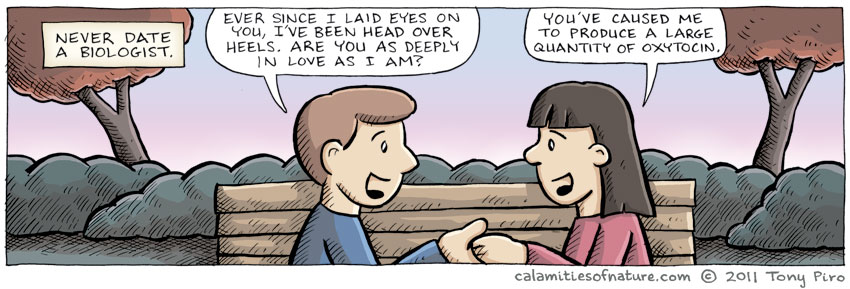
Vasopressin is another hormone that is released during sex and that plays a vital role in commitment and attachment. While oxytocin is enhanced by estrogen, vasopressin is enhanced by testosterone, so it is stronger in men. Vasopressin heightens a man’s responsibility to take care of his family, to feel committed to his spouse (i.e. remain monogamous), to be protective, and to be loyal.
Let’s look at how the bonding agents of oxytocin and vasopressin play out in a committed relationship. Although women do have a physical need for sex, a woman’s desire for sex while in stage three of a relationship, is generally more connected to her emotions. A man’s desire for sex is generally more connected to his physical (and therefore legitimate) need for sex. This difference is what often accounts for the well-known cycle of sexual and emotional frustration that spouses experience.
and/or
The Low Frequency Sex Cycle
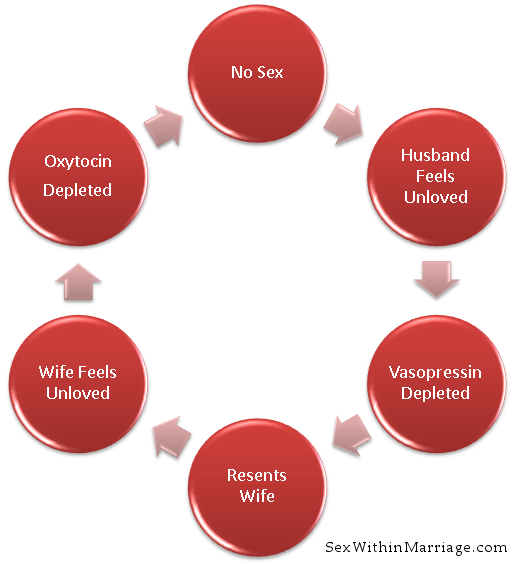 A low frequency sex cycle can look like this: little/no sex in the marriage and the husband feeling unloved. The sex/love hormones, oxytocin and vasopressin, which are released during lovemaking and which bind a husband and wife together, become depleted. The husband shuts down sexually. He may avoid touching his wife because, if he does, he may become sexually aroused. Avoidance is a means of protecting himself from being sexually frustrated. The wife, in turn, feels rejected and unloved, feeling that her emotional needs are not being met. The husband can grow to resent his wife because, if he does meet her emotional needs, he may not get his physical needs met in return. The couple’s situation can begin to feel hopeless. There can be temptation for infidelity, they might wonder if they will stay in a sexless, loveless marriage, they might contemplate a divorce — or they might choose to make a shift in the relationship and start having more sex.
A low frequency sex cycle can look like this: little/no sex in the marriage and the husband feeling unloved. The sex/love hormones, oxytocin and vasopressin, which are released during lovemaking and which bind a husband and wife together, become depleted. The husband shuts down sexually. He may avoid touching his wife because, if he does, he may become sexually aroused. Avoidance is a means of protecting himself from being sexually frustrated. The wife, in turn, feels rejected and unloved, feeling that her emotional needs are not being met. The husband can grow to resent his wife because, if he does meet her emotional needs, he may not get his physical needs met in return. The couple’s situation can begin to feel hopeless. There can be temptation for infidelity, they might wonder if they will stay in a sexless, loveless marriage, they might contemplate a divorce — or they might choose to make a shift in the relationship and start having more sex.
The High Frequency Sex Cycle
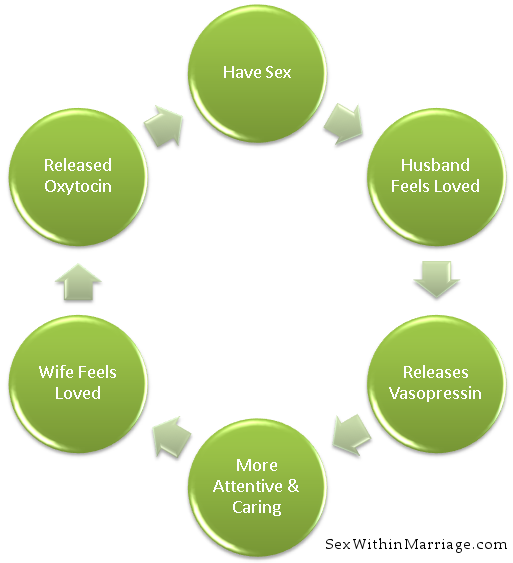 In a high frequency sex cycle, the husband feels loved and there is an ample supply of vasopressin. When the husband’s physical needs are met, he is more able to meet his wife’s emotional needs. When the wife’s emotional needs are met, she feels loved, has a release of oxytocin, and is better able to meet her husband’s physical needs, and then the cycle continues.
In a high frequency sex cycle, the husband feels loved and there is an ample supply of vasopressin. When the husband’s physical needs are met, he is more able to meet his wife’s emotional needs. When the wife’s emotional needs are met, she feels loved, has a release of oxytocin, and is better able to meet her husband’s physical needs, and then the cycle continues.
Naturally, there will be seasons when a couple will fall into low frequency cycles. However, having compassion and understanding for how God made our brains to nurture a covenant relationship with each other will help us to make a unilateral decision to get out of low sex gridlock. God designed our brains to nurture a committed, attached relationship. It’s each person’s responsibility to set those love hormones into motion.
Blessings,

Kathryn Manley, MS, LPC, CST
Individual, Family, and Marriage Counseling
Certified Sex Therapist (AASECT)



